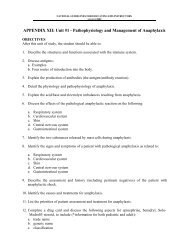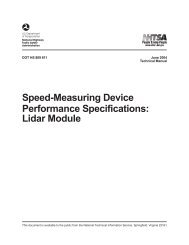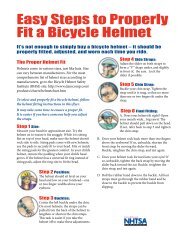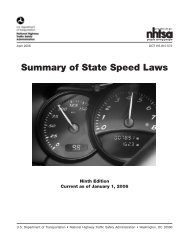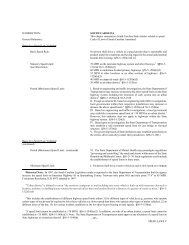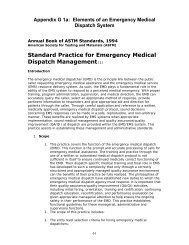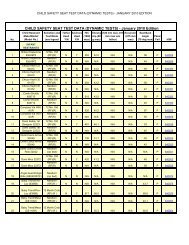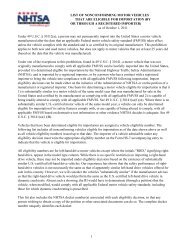The Criminal Justice System: A Guide for Law Enforcement ... - NHTSA
The Criminal Justice System: A Guide for Law Enforcement ... - NHTSA
The Criminal Justice System: A Guide for Law Enforcement ... - NHTSA
Create successful ePaper yourself
Turn your PDF publications into a flip-book with our unique Google optimized e-Paper software.
such as drugs or a gun, or (3) identification evidence such as lineup identification or an<br />
on-the-street show up identification.<br />
Suspended Sentence A sentence in which the defendant could serve a maximum<br />
term of say, 10 years, but is allowed to serve far less time in jail in exchange <strong>for</strong> the<br />
opportunity to not engage in any further criminal conduct. If the defendant fails to abide<br />
by the directives of his release, his “suspended” sentence is reactivated, and he could<br />
serve the entire 10 years.<br />
Trial A trial determines the question of the defendant’s guilt. <strong>The</strong> verdict of the<br />
jury is either “guilty” or “not guilty” on each charge given to the jury <strong>for</strong> determination.<br />
<strong>The</strong> jury is instructed to find a defendant not guilty if the prosecution fails to prove the<br />
charge beyond a reasonable doubt. A verdict of not guilty is not a finding of innocence;<br />
rather, it is a finding that the charge is not proven beyond a reasonable doubt.<br />
Generally, the stages of a trial are:<br />
Jury selection<br />
. Preliminary legal instructions by the court to the jury<br />
Opening statement by the prosecutor<br />
Opening statement by defense counsel<br />
Presentation of prosecution evidence<br />
Presentation of defense evidence (optional)<br />
Presentation of prosecution rebuttal evidence (optional)<br />
Summations by defense counsel and prosecutor<br />
Legal instructions by the judge to the jury (“the charge” to the jury)<br />
Jury deliberations<br />
Verdict<br />
In stage 3—the opening statement by the prosecutor—the prosecutor must set<br />
<strong>for</strong>th an outline of the evidence to be presented. This is a very good time <strong>for</strong> a spectator<br />
to hear a summary of the evidence, which may never have been stated in public be<strong>for</strong>e.<br />
Warrant A written order by a judge authorizing the police to take some action.<br />
An arrest warrant authorizes the police to arrest someone, and a search warrant<br />
authorizes the police to search somewhere <strong>for</strong> something. <strong>The</strong> Fourth Amendment<br />
states that warrants may only be issued upon probable cause (also referred to as<br />
“reasonable cause”).<br />
38



